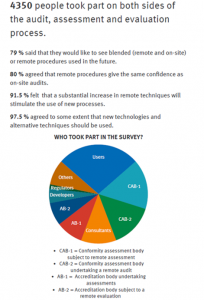SUMMARY
A joint IAF/ILAC/ISO survey of more than 4000 participants showed that a large majority of respondents prefer remote or blended audits, assessments, and evaluations, feel that remote activities provide as much confidence as on-site, and would like to see continued or increased use of remote activities in the future.
BACKGROUND
The COVID-19 pandemic caused a substantial shift to remote working in all walks of life. Organisations such as accreditation and conformity assessment bodies now provide much-needed services such as certification, inspection and testing and related accreditation activities remotely, in a dramatic shift from a preferred use of on-site techniques.
While we are still far from establishing what the so-called ‘new normal’ will look like, it is clear that some degree of remote working will remain in place for many industries. What will that look like for those who work in conformity assessment? More specifically, what degree of enthusiasm and preparedness will exist for this new way of working in the conformity assessment industry in the future?
In August 2021, IAF, ILAC and ISO concluded a joint survey that sought to answer these questions. The survey aimed to obtain the views of a diverse range of stakeholders on the use of remote techniques.

SURVEY RESPONDENTS
In total, 4350 complete responses were received including from those who were both subject to, and deliver remote audits, assessments and evaluations. In addition to providing a snapshot of attitudes towards remote techniques, the survey received hundreds of suggestions, ideas and proposals from users, auditors, assessors and other people who have been subject to or delivered remote audits, assessments and evaluations.
KEY FINDINGS
Respondents saw many benefits to use of remote activities during pandemic conditions including:
• Maintenance of status of recognition/accreditation/certification – 98% felt remote activities were beneficial or somewhat beneficial
• Reduced travel time and costs: 96%
• Reduced travel risk: 95%
• Reduced environmental footprint: 95%
• Efficient use of personnel being audited/assessed/evaluated — 87%
• Opportunity for witness activities in one or more sites/facilities: 82.5%
• Keeping to strict time/schedule of the audit/assessment/evaluation plan: 82%
In terms of the future:
• 79% said that they would like to see blended (remote and on-site) or remote procedures used
• 80% agreed that remote procedures give the same confidence as on-site audits
• 91.5% felt that a substantial increase in remote techniques will stimulate the use of new processes
• 97.5% agreed to some extent that new technologies and alternative techniques should be used.
IN THEIR OWN WORDS
Assuming no further pandemic restrictions, 60% say they would prefer blended audits, assessments or evaluations, i.e. that mix both remote and on-site techniques; 19% preferred ‘fully remote’ and 21% preferred to continue ‘on-site.’
Building on the idea of future delivery, when asked “to what extent organisations can benefit from remote techniques?” 33% said “to a great extent”, 57% said “to some extent”, while 8% said “not much” and just 1% said “none”.
This strongly positive view of remote techniques in the future was informed by the respondents’ experience of remote techniques: 71% said they were satisfied with their remote experience, while 26% were somewhat satisfied, and just 4% said they were dissatisfied.
“The survey indicates a huge level of support for remote techniques, a clear understanding of the benefits and a desire to see these methods adopted more widely. Enthusiasm for new means of delivering audits, assessments and evaluations is clear and we will work hard to continue to evolve the support for all those who use and benefit from certification, accreditation and standards”.
Xiao Jianhua
IAF Chair
OPPORTUNITIES FOR IMPROVEMENT
Respondents also provided hundreds of comments on how to reap the benefits of remote activities, providing an opportunity for IAF, ILAC, ISO and their members to learn and improve.
• 37% of respondents believe that current rules (including International Standards, IAF and ILAC procedures) should be modified to better accommodate remote techniques
• 53% of respondents felt that the preparation was, to some extent, more difficult and time-consuming with remote.
• It was also clear that internet connectivity and IT security need to be adequately addressed to deliver confidence and reliable results from remote activities.
In the coming months, on the basis of the result of this survey, IAF, ILAC and ISO, each in their own role and jointly as appropriate, will further analyse the results and consider the steps necessary, including stakeholder input, to incorporate the outcomes in the relevant documents and processes as the world moves to a ‘new normal’ as a result of the COVID-19 pandemic.
RELATED LINKS
International Accreditation Forum
ILAC
International Laboratory Accreditation Cooperation
ISO
International Organization for Standardization
